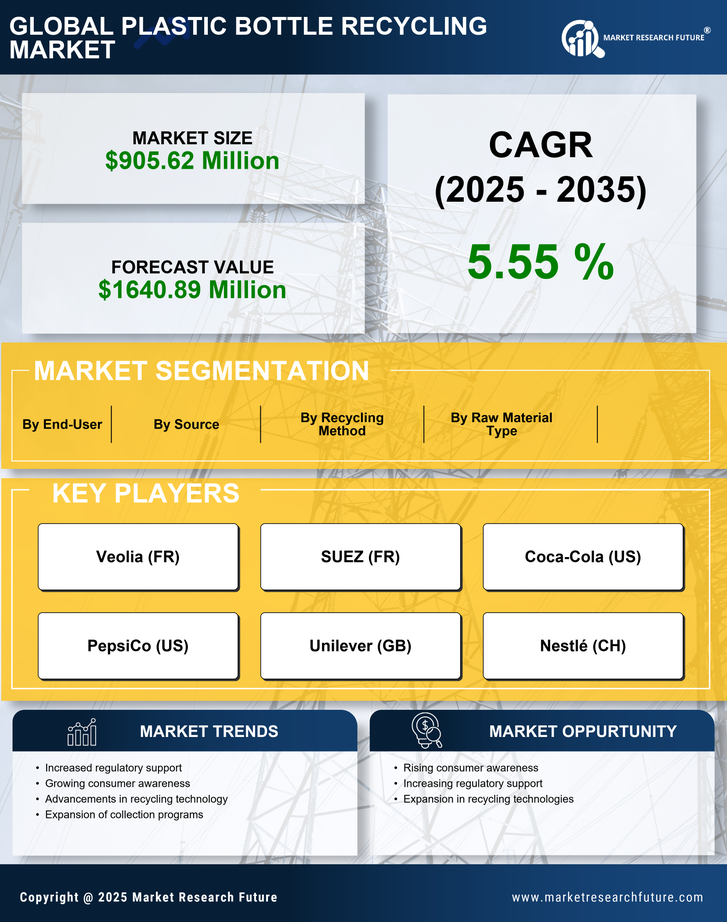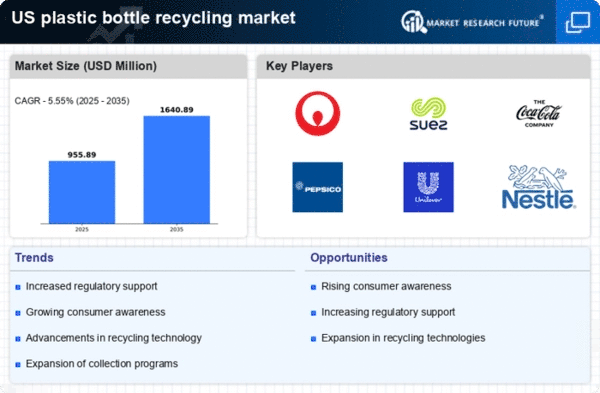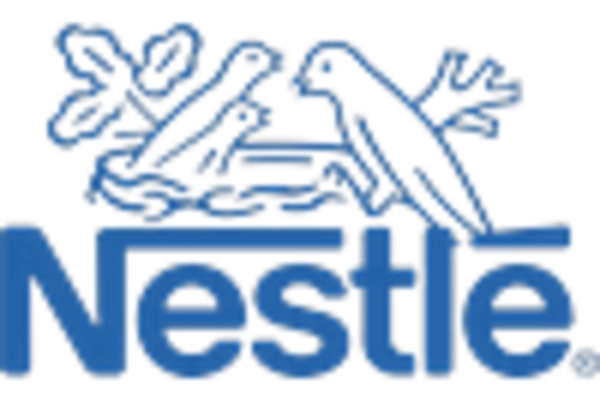Legislative and Policy Support
Legislative measures and policies aimed at promoting recycling are crucial drivers of the plastic bottle-recycling market. Various states have implemented bottle deposit laws, which incentivize consumers to return plastic bottles for recycling. For example, states with deposit return schemes report recycling rates of up to 90%, significantly higher than the national average of around 30%. Such policies not only encourage consumer participation but also create a stable supply of recyclable materials for the market. Furthermore, federal initiatives aimed at reducing plastic waste are likely to enhance funding for recycling programs and infrastructure development. As legislation continues to evolve, the plastic bottle-recycling market will benefit from increased support and resources, fostering a more robust recycling ecosystem.
Rising Environmental Awareness
The increasing awareness of environmental issues among consumers is a pivotal driver for the plastic bottle-recycling market. As individuals become more conscious of their ecological footprint, they are more likely to engage in recycling practices. This shift in consumer behavior is reflected in surveys indicating that approximately 75% of Americans express a desire to recycle more. Consequently, businesses are responding by enhancing their recycling programs, which in turn stimulates growth in the plastic bottle-recycling market. Furthermore, educational campaigns aimed at promoting recycling have gained traction, leading to higher participation rates. This heightened environmental consciousness not only encourages recycling but also fosters a culture of sustainability, which is essential for the long-term viability of the plastic bottle-recycling market.
Corporate Sustainability Initiatives
Many corporations are increasingly adopting sustainability initiatives, which significantly impacts the plastic bottle-recycling market. Companies are recognizing the importance of integrating recycling into their business models to meet consumer expectations and regulatory requirements. For instance, major beverage companies have committed to using recycled materials in their products, with some aiming for 50% recycled content by 2030. This trend not only enhances brand loyalty but also drives demand for recycled materials, thereby bolstering the plastic bottle-recycling market. Additionally, corporate social responsibility (CSR) programs often include recycling efforts, which can lead to partnerships with recycling facilities and increased investment in recycling technologies. As corporations prioritize sustainability, the plastic bottle-recycling market is likely to experience accelerated growth.
Consumer Demand for Recycled Products
The growing consumer demand for products made from recycled materials is a significant driver of the plastic bottle-recycling market. As consumers become more environmentally conscious, they are increasingly seeking products that incorporate recycled content. Reports indicate that nearly 60% of consumers are willing to pay a premium for products made from recycled materials. This trend is prompting manufacturers to source more recycled plastics, thereby increasing the demand for recycling services. Retailers are also responding by promoting products with recycled content, further stimulating the plastic bottle-recycling market. As this demand continues to rise, it is likely to encourage investment in recycling infrastructure and technologies, ultimately leading to a more sustainable circular economy.
Technological Innovations in Recycling
Technological advancements in recycling processes are transforming the plastic bottle-recycling market. Innovations such as advanced sorting technologies and chemical recycling methods are enhancing the efficiency and effectiveness of recycling operations. For instance, new sorting technologies can achieve up to 95% accuracy in separating different types of plastics, which significantly improves the quality of recycled materials. Additionally, chemical recycling processes allow for the breakdown of plastics into their original monomers, enabling the production of high-quality recycled products. These technological improvements not only increase the volume of recycled plastic available but also reduce the costs associated with recycling. As technology continues to evolve, the plastic bottle-recycling market is poised for substantial growth, driven by enhanced capabilities and efficiencies.

















